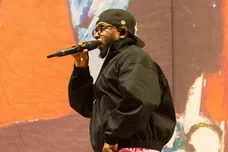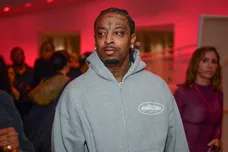Ranking Jay Z albums can be like doing any other Jay-related list: it's impossible to get it right. The God MC himself ranked his albums last year via Life + Times and caused an uproar from just about everyone, including die hard fans, casual listeners and committed Internet trolls, who bombarded the comment section with commentary like, "Nah! Vol. 2 wasn't all that good" and "Are you shitting me?!" There's a reason people are so passionate in their critiques of anything Jay Z related, and it's simple: Jay Z is as good as it gets. His catalogue, which includes several classic albums and even more classic songs, is the stuff of legend. Hov's worse albums are better than most rappers' best albums, which force critics to grade his albums on a completely different scale. This is all what makes it impossible to get a Jay Z album ranking perfect. But with all of that being said, here, we attempt to rank Jay Z ’s solo albums, as we did for both Nas and Eminem. These rankings are not only based on quality, but also impact and importance. Enjoy, and sound off in the comments.
The Dynasty Roc la Familia (2000)

“Intro,” the opening track to JAY Z’s fifth solo album, The Dynasty Roc la Familia is one of the best intros found on a rap album in recent memory. The Just Blaze-laced track finds Jay spitting lines like, “Got a strange way of seeing life like / I’m Stevie Wonder with beads under the du-rag / Intuition is there / Even when my vision’s impaired”, and demonstrates just why, at the time of this album’s release, he was light-years ahead of much of his competition. On songs like, "This Can't be Life", "Soon You'll Understand" and "Where Have You Been", which features both him and Beanie Sigel directing heart-piercing lyrics like, “Fuck you very much / You showed me the worse kind of pain” at their absent fathers. The often cool and somewhat detached Shawn Carter was not only at his most revealing since Vol. 1: In My Lifetime, but was also at his most vulnerable. The chemistry of the Roc, particularly that of Jay and Beans, was at an all-time high throughout the album which was originally slated to be a Rocafella compilation project, but ended up being Jay's fifth solo effort. The dynamic duo connected like no other on nine of The Dynasty’s sixteen tracks. Though The Dynasty Roc la Familia had standout moments, there were a good amount of very forgettable songs on this album like "Holla" and "Parking Lot Pimpin’." Like many Jay Z albums, The Dynasty Roc la Familia was rumored to be his last, and it’s a good thing that this wasn't. If this album was his final statement, his post-retirement career and legacy would have certainly been a lot different.
Kingdom Come (2006)

Whether it was in 1995 or 2001, a post-retirement Michael Jordan returned to the game he once dominated a little rusty, and the same can be said for the Mike Jordan of recording. Jay Z really wasn't on his A-game with Kingdom Come. Showcasing Jay's progression was a focal point on this album. Listeners were consistently reminded of this on songs like the disc’s title track, where Jay declares, “I’m so evolved / I’m so involved / I’m showing growth / I’m so in charged.” The Black Album showed that the Shawn Carter from Marcy Projects had grown up without him having to remind us on every bar that he had grown up. With Kingdom Come, it felt like Jay was force feeding the concept of hip hop maturing, so much so that, it seemed as if making a great album was more of an afterthought. But just when tracks like "30 Something", "Anything" and "Dig a Hole" left fans wondering if the best rapper alive was long past his prime, a record like "Do U Wanna Ride" – which was an audio letter to Jay’s, at the time, incarcerated cousin Emory Jones – proved that Jay still held the crown. In regards to subject matter, Kingdom Come was what you should expect from an artist of Jay's stature during that time. He exuded a maturity and worldliness seldom seen in hip hop. Throughout the album he offered his thoughts on an array of topics like the Rocafella breakup, feeling neglected by his at the time girlfriend, Beyonce, the pitfalls of celebrity and the aftermath of Hurricane Katrina.
The Blueprint 2: The Gift & The Curse (2002)

Since the beginning of his career, the concept of less-is-more has really worked in favor of Hov, so when he decided to stray away from that approach with The Blueprint 2: The Gift & The Curse it wasn't much of a surprise that it didn't really work out too well. There were just too many songs on this two-disc set that housed over twenty tracks (if this album consisted of its top thirteen tracks, this list would look a little different). Songs like "2 Many" and "The Bounce" would've been cool if they were on a Timbaland album or a Rocafella compilation album, but for a Jay album, especially one which followed the masterpiece which was The Blueprint, those records, and many others on the album just missed the mark. In an attempt to showcase his eclectic musical tastes, he chose to expand beyond the soulful, sample-based foundation of The Blueprint. The end result was BP2 just lacking a cohesiveness and being more all over the place than anything else. Collaborations are usually a strongpoint on Jay albums, but not on The Blueprint 2: The Gift & The Curse. Collaborations with a pop star like Lenny Kravits ("Guns and Roses") and reggae sensation Sean Paul ("What They Gonna Do") were letdowns. Like on Vol. 2: Hard Knock Life, The Gift & The Curse, found Shawn Carter in full on Jay Z mode. Highlights here include the often forgotten Nas-diss, "Blueprint 2", the grown and sexy, "Excuse Me Miss", the Beanie Sigel and Scarface-assisted, “Somehow, Someway” and “A Ballad for the Fallen Soldier”, a record where Jay compared the journey of a soldier at war and a soldier in the streets.
Magna Carta Holy Grail (2013)

Years down the line when critics revisit Jay’s twelfth studio album, Magna Carta Holy Grail, they’ll probably focus more on the #NewRules campaign attached to it than on the music. Yes, it was a solid album, especially when compared to many of the rap albums released in 2013, but its innovative release strategy, which involved an unprecedented partnership with Samsung was a lot more impactful than the music itself. Since the album’s release we’ve seen a few big name artists like Beyonce and J. Cole follow in Jay’s footsteps and forgo traditional album release set-ups. In regards to the music found on Magna Carta, the production, which was mostly handled by Timbaland was the highlight and made it easier to tolerate Jay’s lack of lyrical effort. MCHG will stand as one of his, if not his most revealing album. He provided listeners with in-depth insights into his views on topics like the importance of family and race in America. He even questioned the concept of religion and speaks on his fear of fatherhood. Aside from being lyrically underwhelming, what separated this album from other Jay Z albums is that not many of the songs on Magna Carta Holy Grail have staying power. Is this a Hov album you'd want to go back and listen to any other day of the week?
The Blueprint 3 (2009)

Much of the hype surrounding JAY Z’s more recent albums have had to do with just about anything other than the music. The Blueprint 3 continued in that fashion with Jay announcing that he had bought himself out of his recording contract for a reported $5 million and would be leaving his longtime home, Def Jam, for his newly formed entertainment company, Roc Nation. Also adding to the hoopla associated with that album was him calling for an end to gimmicks like the overuse of pitch-correcting tool, auto-tune on "D.O.A. (Death Of Auto-Tune)", and him scoring his first number one song on the Hot 100 chart with “Empire State of Mind." Executive produced by Kanye West, BP3 was a pretty good album that featured Jay further reminding us that he was on another level. This sentiment was echoed on songs like, "On To The Next One", "Off That", "Already Home" and "Reminder." One thing which became more evident with The Blueprint 3 was that though post-retirement Jay Z was more sophisticated, more calculated, worldlier, deeper (double entendres galore), he was less of a rapper. He was still rapping, but definitely not like he use to.
Vol. 1: In My Lifetime (1997)

Having to follow up a classic album with something that satisfies both fans and critics is always tricky, which is why so many artists have failed so miserably at it. Jay Z almost escaped the curse of the classic album follow-up with Vol. 1: In My Lifetime. The album had gems like, "Imaginary Player", "Where I'm From" and "Streets Is Watching," which says a lot. From the DJ Premier-produced intro, "A Million and One Questions" to the Kelly Price-assisted, "You Must Love Me", Vol. 1 showcased the complexity of Shawn Carter: he could be arrogant (“The City Is Mine”), introspective ("Lucky Me"), a player (“Who You Wit II”), remorseful (“You Must Love Me”) and much more. But what plagued this album more than anything else was Jay's not-so-subtle attempts at mainstream success. Songs like, "The City Is Mine", "Sunshine" and what is arguably the worst Jay Z song to date, "I Know What Girls Like" distracts listeners from the fact that Jay had become a better rapper and songwriter on Vol. 1: In My Lifetime then he was on his debut. This is a very underrated album.
Vol. 3: Life and Times of S. Carter (1999)

With a catalogue as lengthy as Jay Z’s, it's easy for certain albums to get overlooked. Vol. 3: Life and Times of S. Carter is the perfect example this. Where its predecessor showcased Jay's shear ability to be a superstar, Vol. 3 offered glimpses of why Jay would one day become one of the rap game's most influential figures. His swagger, intellect and pure lyrical prowess were all on full display on songs like "So Ghetto", "There's Been A Murder" and "Come and Get Me." On “Dopeman”, he once again toyed with the notion that the music business was eerily reminiscent to the drug world, but instead of comparing the two, he uses the underworld as a metaphor for describing his music business dealings. "And is true you operate the criminal enterprise / Known as Roc-a-Fella, in charge of his meteoric rise?", he raps. Vol. 3: Life and Times of S. Carter was a diverse collection of songs that featured the likes of Mariah Carey, Dr. Dre, Juvenile and UGK, who appeared on the player's anthem, "Big Pimpin’" that helped Jay to oush further ahead of his rap counterparts.
American Gangster (2007)

“Niggas said Hova was over / Such dummies,” raps Jay Z on “Success”, a cut from the last great Jay Z album, American Gangster. After the release of the lackluster Kingdome Come, many fans and critics felt that it may have been time for him to step away from the mic, for good, but AG proved that wasn’t necessary. For the album, which ended up being his most cohesive project in years, he reverted back to, and relied heavily on, soulful productions, the bulk of which was provided by Diddy and a reunited The Hitmen crew. The Neptunes, Jermaine Dupri, NO ID, Just Blaze, DJ Toomp and others also helped to craft the soul of the album. Cinematic in approach, American Gangster was loosely based on both Jay’s personal experiences as a hustler and American Gangster, the movie which inspired Hov to record his album of the same name, and showcased his knack for storytelling. However, AG wasn’t all street tales, and on records like, "Ignorant Shit" and "Say Hello", he tackles of the moment sensitive issues like the Don Imus controversy, and the controversy surrounding the Jena 6. The album also featured Hov’s first Lil Wayne collaboration, and one of his last Beanie Sigel collaborations. The issue with American Gangster was timing. It was released towards the end of 2007, which was a time when albums began to really lose importance. This may have led to Jay Z’s last great album also being his most overlooked.
Vol. 2: Hard Knock Life

Vol. 2: Hard Knock Life (1998)
Where Reasonable Doubt introduced the world to Shawn Corey Carter and Vol. 1: In My Lifetime proved that Reasonable Doubt wasn't a fluke, Vol. 2: Hard Knock Life catapulted Jay Z into the superstar stratosphere. Spearheaded by the success of the hit single "Hard Knock Life (Ghetto Anthem)”, the album went on the sell over five million copies. At the time of its release, Vol. 2 was Jay’s most adventurous album. In lieu of the soulful production that was at the core of his first two albums, he opted for the more futuristic sounds of producers like Swizz Beats and Timbaland. Vol. 2 was feature-heavy, which was a first for Jay, but appearances from the likes of Ja Rule, DMX, Too Short, The Lox, Jermaine Dupri and the Rocafella crew never once overwhelmed Hov or his presence. With all of its glory, Vol. 2: Hard Knock Life did however showcase a much less reflective Jay than found on his Reasonable Doubt and Vol. 1: In My Lifetime. This was also the first album where he effortlessly exhibited his ability to dumb it down.
Reasonable Doubt (1996)

Not much can be said about Reasonable Doubt that hasn’t already been said. It’s the album that began it all for the God MC. Described as a "crowning achievement", a "seminal work" and "undisputed classic", it’s a masterpiece that has continued to stand the test of time. On the album, a relatively unknown Brooklyn MC went toe to toe with the King of New York, The Notorious B.I.G. on "Brooklyn's Finest" and held his own alongside Queen Mary J. Blige on the silky smooth "Can't Knock the Hustle." This one album contained classics like “Dead Presidents II”, “D’Evils”, “Can I Live”, "22 Twos", “Aint No Nigga”, "Cashmere Thoughts" and “Regrets.” For many, this will remain Jay Z’s finest work, but its impact wasn’t as evident upon its release. The Blueprint and The Black Album both, in a sense, altered the course of hip hop.
The Black Album (2003)

"There's never been a nigga this good for this long," Jay Z declared on The Black Album's "What More Can I Say." However bold a statement, it’s difficult to argue otherwise. You can ask about him. He dropped The Black Album and backed out of the game as the best rapper alive and much more. When the time came for, what was supposed to be his final album to hit retailers, Jay had already been perched comfortably atop the rap world, but that album further cemented him as one of the greatest musicians of his generation, and also one of popular culture’s most impactful figures. He rapped about switching out his athletic jerseys (a hip hop staple at the time) for more age appropriate attire like button up shirts, and the majority of rap game followed suit. The Black Album is revered for a variety of legitimate reasons, but what's often overlooked in regards to this near-flawless album is its impact. It helped cause a shift in the hip hop landscape. Soon after its release, the rules of hip hop became a lot less rigid and hip hop began to transition away from a gangster rap state (think 50 Cent) into a less aggressive and more eclectic era (think Kanye West).
The Blueprint (2001)

By the time 2001 had come around, Jay Z had already proven that he was a superb lyricist, chart-topping artist, bona fide superstar and respected businessman, but with the release of The Blueprint Jay cemented his legacy as one of the greatest rappers of all time. On Vol. 1: In My Lifetime, Jay posed the question, "Who's the best MC, Biggie, Jay Z or Nas?" and on The Blueprint, he made it clear who he thought everyone’s pick should be. He made it known that he was coming for The Notorious B.I.G.’s crown as King of New York when he declared, “If I ain’t better than Big, then I’m the closest one”, while also calling into question Nas’ status as one of hip hop’s elite on “Takeover.” Aside from a scene-stealing verse from Eminem ("Renegade") and an uncredited Kanye West hook (“Never Change”), The Blueprint was all Jay. This album remains Hov’s most influential. Even though The Dynasty Roc la Familia had introduced us to the chemistry Jay had with beatsmiths Kanye West and Just Blaze, The Blueprint is what established both producers as certified hit-makers. This album also ushered in what many fans and critics would consider the Rocafella golden era, sparked one of the greatest battles in the history of rap music, and, as we've mentioned, solidified Jay Z’s claim of being one of the greatest rappers of all time.







